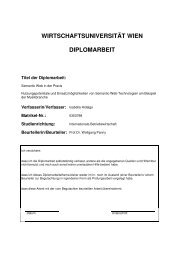Wirtschaftsuniversität Wien Magisterarbeit - SemanticLab
Wirtschaftsuniversität Wien Magisterarbeit - SemanticLab
Wirtschaftsuniversität Wien Magisterarbeit - SemanticLab
You also want an ePaper? Increase the reach of your titles
YUMPU automatically turns print PDFs into web optimized ePapers that Google loves.
2. Privacy Threats<br />
Privacy is the “claim of individuals to determine for themselves, when, how and to<br />
what extent information about them is communicated to others” (Westin 1967 cited in<br />
[Oli04]). When it comes to privacy on the Internet, there are a lot of threats which<br />
menace this claim and they can be categorized in different ways. According to [Sar03]<br />
there are general threats which menace financial, medical or political privacy. Then<br />
there are common privacy sensitive applications which are used by Internet users quite<br />
frequently such as search engines, social network platforms, e-commerce applications or<br />
personalized web-services. All these applications have one thing in common: they use<br />
sensitive user-data to deliver their services. That is why common privacy threats and<br />
privacy sensitive applications are going to be introduced in this chapter. Additionally,<br />
some background information will also be provided on how technical issues play an<br />
important role in privacy on the Internet.<br />
2.1. Individual privacy attitudes<br />
When discussing privacy threats on the Internet, the biggest threat is sometimes forgotten:<br />
the person in front of the computer. All kinds of technical solutions can be<br />
implemented and enforced but will not make a difference if users in front of the computer<br />
do not reflect about their actions. This topic was already an issue when the World<br />
Wide Web was becoming more popular. In 1998, Alan Westin published a categorization<br />
of users and their individual attitudes to privacy as also described in [Kob07]. These<br />
three different attitudes can also be applied to the Internet and are described as the<br />
“privacy fundamentalists”, the “privacy pragmatists” and the “privacy unconcerned”:<br />
• Privacy fundamentalists can be characterized by their “extreme concern about<br />
any use of their data and an unwillingness to disclose information, even when<br />
privacy protection mechanisms would be in place” [Kob07].<br />
• Privacy pragmatists on the other hand are generally concerned about their<br />
privacy, but not as much as the fundamentalists. If they can see a certain reason<br />
for disclosing private data, they are willing to do so.<br />
• The exact opposite of the privacy fundamentalists are privacy unconcerned<br />
which are not as distressed by the thought of disclose their private data and how<br />
it may be used by third parties.<br />
Despite individual privacy attitudes there are other circumstances where privacy may<br />
be threatened. That is why in the following two sections, general privacy issues on the<br />
6





